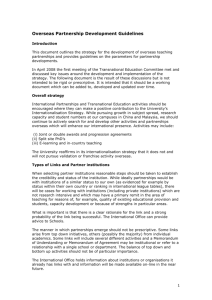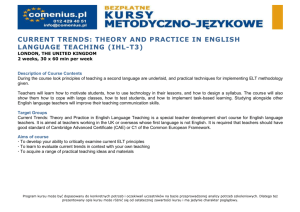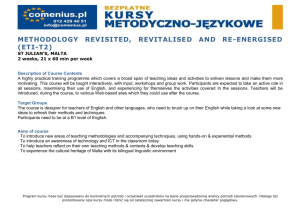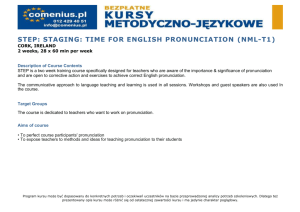(TNE) Programs - Checklist for Program Approval
advertisement
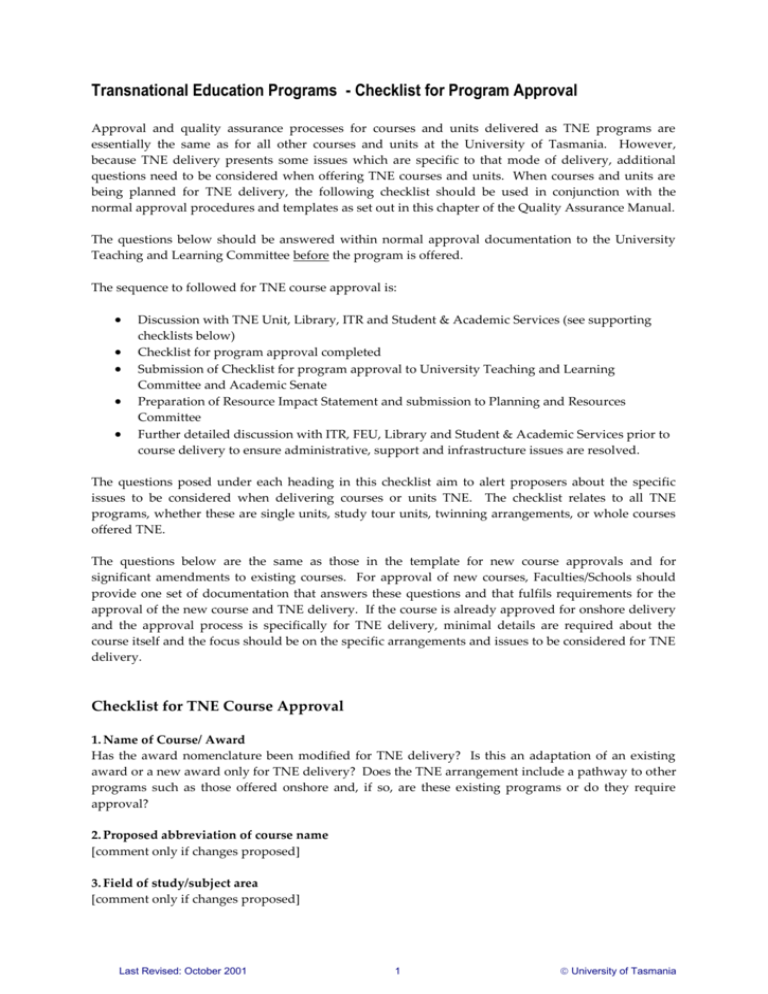
Transnational Education Programs - Checklist for Program Approval Approval and quality assurance processes for courses and units delivered as TNE programs are essentially the same as for all other courses and units at the University of Tasmania. However, because TNE delivery presents some issues which are specific to that mode of delivery, additional questions need to be considered when offering TNE courses and units. When courses and units are being planned for TNE delivery, the following checklist should be used in conjunction with the normal approval procedures and templates as set out in this chapter of the Quality Assurance Manual. The questions below should be answered within normal approval documentation to the University Teaching and Learning Committee before the program is offered. The sequence to followed for TNE course approval is: Discussion with TNE Unit, Library, ITR and Student & Academic Services (see supporting checklists below) Checklist for program approval completed Submission of Checklist for program approval to University Teaching and Learning Committee and Academic Senate Preparation of Resource Impact Statement and submission to Planning and Resources Committee Further detailed discussion with ITR, FEU, Library and Student & Academic Services prior to course delivery to ensure administrative, support and infrastructure issues are resolved. The questions posed under each heading in this checklist aim to alert proposers about the specific issues to be considered when delivering courses or units TNE. The checklist relates to all TNE programs, whether these are single units, study tour units, twinning arrangements, or whole courses offered TNE. The questions below are the same as those in the template for new course approvals and for significant amendments to existing courses. For approval of new courses, Faculties/Schools should provide one set of documentation that answers these questions and that fulfils requirements for the approval of the new course and TNE delivery. If the course is already approved for onshore delivery and the approval process is specifically for TNE delivery, minimal details are required about the course itself and the focus should be on the specific arrangements and issues to be considered for TNE delivery. Checklist for TNE Course Approval 1. Name of Course/ Award Has the award nomenclature been modified for TNE delivery? Is this an adaptation of an existing award or a new award only for TNE delivery? Does the TNE arrangement include a pathway to other programs such as those offered onshore and, if so, are these existing programs or do they require approval? 2. Proposed abbreviation of course name [comment only if changes proposed] 3. Field of study/subject area [comment only if changes proposed] Last Revised: October 2001 1 University of Tasmania 4. Proposed year and semester of introduction 5. School/s and/or institutions that will teach the course For TNE delivery partners, outline what steps have been taken to ensure that their reputation (educational and financial) is appropriate and that the resources, facilities and staff they have to support the course are of an appropriate standard? 6. Where the course will be taught Provide details about where various components of the course will be taught. 7. Course Advisory Committee Comment on role of Course Advisory Committee in providing input specifically to TNE delivery of the course. Outline involvement in the Course Advisory Committee of staff from TNE partners and staff from the International Office. The Course Advisory Committee should have a role in planning the course and in the ongoing monitoring of the course once implemented in the TNE context. 8. Reasons for introducing the course [comment specifically on reasons for TNE delivery] 9. Educational objectives of the course Are there any modifications to course objectives for TNE delivery? 10. Length of course and maximum duration time for completion Provide details and justification of differences between course duration when offered TNE and onshore. 11. Teaching mode/delivery Provide details about teaching mode and delivery for TNE students. How do these differ from teaching arrangements for onshore students and how is equivalence of outcomes maintained? What arrangements are in place for ensuring that equivalence of assessment outcomes are maintained? What is the role of University of Tasmania staff in setting and marking assessment tasks? How will students be supported: in their English language requirements? in developing academic study skills, information literacy skills, and IT literacy? How will students be oriented to study in a UTAS course? (see: http://www.utas.edu.au/tl/transnational/index.html) How will students be supported if and when they make a transition to studying in Tasmania? What special QA arrangements are in place if the course is not delivered in English? 12. Course structure Has the course structure been modified for TNE delivery? If so, how has the integrity and standard of the course been maintained? 13. Generic attributes [comment only if there are specific considerations for the TNE context] Last Revised: October 2001 2 University of Tasmania 14. Admission requirements What are the TNE admission requirements and how do these compare with onshore admission requirements? How are student entry standards maintained? 15. Articulation with other courses What credit is given to courses offered by other institutions and how does the standard of these courses compare with onshore credit arrangements? 16. Other related courses offered by this University [comment only if there are specific TNE issues] 17. Anticipated professional recognition Are there special requirements by TNE accreditation bodies and, if so, how will these be met? 18. Mechanism for monitoring/evaluating the course Are there specific arrangements in place to evaluate the course and the experience of TNE students? How do TNE students provide feedback to the University of Tasmania on their experience and level of satisfaction? Who monitors this, to whom are reports submitted and how are improvements made? What is the process for student grievances? 19. Library Resources A meeting with the Liaison Librarian is required to consider: Access to information resources, both print and electronic Library Services and support Resource implications 20. IT Access and Resources A meeting with the Director of ITR or nominee is required to consider: Computer hardware and software Access to computing equipment Access to the University’s network, including Vista and email IT training and support for staff and students Resource implications 21. Administrative Arrangements A meeting with the TNE Unit and Student & Academic Services to consider: Administrative contracts and communication channels for the partner institution Proposed commencement timelines Semester timelines Whether the program has fixed schedules or electives Integration of assessment with standard UTAS examination schedules Details for academic transcripts and student records Enrolment status of students 22. Staffing Issues How are TNE staff recruited and how are their qualifications assessed? How are staff development and staff induction provided, both for UTAS teaching offshore and for locally employed staff? How will locally employed staff be assisted to gain an understanding of relevant UTAS teaching polices and approaches? (see: http://www.utas.edu.au/tl/transnational/index.html) Last Revised: October 2001 3 University of Tasmania How will locally employed teaching and administrative staff gain access to UTAS electronic administrative and teaching resources? 23. Other resource issues How will students and locally employed teaching staff gain access to textbooks? What is the process for ensuring adequate equipment is available to students, including laboratories etc.? NOTE: A Resource Impact Statement must be submitted by the Faculty to Planning and Resources Committee for each TNE program prior to final approval being granted. Supporting Checklists (available at http://www.utas.edu.au/tlqam/): TNE Program Library Impact Statement TNE Course IT Infrastructure Impact Statement Administrative Planning and Development Checklist for TNE Programs Last Revised: October 2001 4 University of Tasmania





